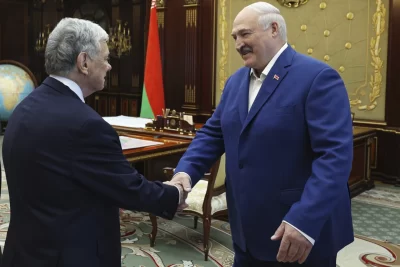
Egypt and Jordan harshly criticized Israel over its actions in Gaza at a summit on Saturday, a sign that the two Western allies that made peace with Israel decades ago are losing patience with its two-week-old war against Hamas.
Egyptian President Abdel Fattah el-Sissi, who hosted the summit, again rejected any talk of driving Gaza’s 2.3 million Palestinians into the Sinai Peninsula and warned against the “liquidation of the Palestinian cause.” Jordan’s King Abdullah II called Israel’s siege and bombardment of Gaza “a war crime.”
The speeches reflected growing anger in the region, even among those with close ties to Israel who have often worked as mediators, as the war sparked by a massive Hamas attack enters a third week with casualties mounting and no end in sight.
Egypt is especially concerned about a massive influx of Palestinians crossing into its territory, something that it fears would, among other things, severely undermine hopes for a Palestinian state. Vague remarks by some Israeli politicians and military officials suggesting people leave Gaza have alarmed Israel’s neighbors, as have Israeli orders for Palestinian civilians to evacuate to the south, toward Egypt.
In his opening remarks, el-Sissi said Egypt vehemently rejected “the forced displacement of the Palestinians and their transfer to Egyptian lands in Sinai.”
Jordan’s king delivered the same message, expressing his “unequivocal rejection” of any displacement of Palestinians. Jordan already hosts the largest number of displaced Palestinians from previous Mideast wars.
“This is a war crime according to international law, and a red line for all of us,” he told the summit.
Palestinian President Mahmoud Abbas, who leads the Palestinian Authority, a government exercising semi-autonomous control in the occupied West Bank, called for Israel to stop “its barbaric aggression” in Gaza. He also warned against attempts to push Palestinians out of the coastal territory.
“We will not leave, we will not leave, we will not leave, and we will remain in our land,” he told the summit.
Israel says it is determined to destroy Gaza’s Hamas rulers but has said little about its endgame.
On Friday, Israeli Defense Minister Yoav Gallant laid out a three-stage plan in which airstrikes and “maneuvering” — a presumed reference to a ground attack — would aim to root out Hamas before a period of lower intensity mop-up operations. Then, a new “security regime” would be created in Gaza along with “the removal of Israel’s responsibility for life in the Gaza Strip,” Gallant said.
He did not say who would run Gaza after Hamas.
Meanwhile, Israel has ordered more than half of the 2.3 million Palestinians in Gaza to evacuate from north to south within the territory it has completely sealed off, effectively pushing hundreds of thousands of Palestinians toward the Egyptian border.
Amos Gilad, a former Israeli defense official, said Israel’s ambiguity on the matter is endangering crucial ties with Egypt. “I think a peace treaty with Egypt is highly important, highly crucial for the national security of Israel and Egypt and the whole structure of peace in the world,” he said.
Gilad said Prime Minister Benjamin Netanyahu needs to speak directly with the leaders of Egypt and Jordan, and say publicly that Palestinians will not be entering their countries.
Two senior Egyptian officials said relations with Israel have reached a boiling point.
They said Egypt has conveyed its frustration over Israeli comments about displacement to the United States, which brokered Camp David Accords in the 1970s. Both officials spoke on condition of anonymity because they were not authorized to brief the media.
Egypt worries that a mass exodus would risk bringing militants into Sinai, from where they might launch attacks on Israel, endangering the peace treaty.
Arab countries also fear a repeat of the mass exodus of Palestinians from what is now Israel before and during the 1948 war surrounding its creation, when some 700,000 fled or were driven out, an event Palestinians refer to as the Nakba, or catastrophe. Those refugees and their descendants, who now number nearly 6 million, were never allowed to return.
At Saturday’s gathering, the anger extended beyond the fears of mass displacement.
Both leaders condemned Israel’s air campaign in Gaza, which has killed more than 4,300 Palestinians, including many civilians, according to health authorities in Gaza. Israel says it is only striking Hamas targets and is abiding by international law.
The war was sparked by a wide-ranging Hamas incursion into southern Israel on Oct. 7 in which over 1,400 people were killed, the vast majority of them civilians.
Abdullah, who is among the closest Western allies in the region, accused Israel of “collective punishment of a besieged and helpless people.”
“It is a flagrant violation of international humanitarian law. It is a war crime,” he said.
He went on to accuse the international community of ignoring Palestinian suffering, saying it had sent a “loud and clear message” to the Arab world that “Palestinian lives matter less than Israeli ones.”
___
Associated Press writer Julia Frankel in Jerusalem contributed.




